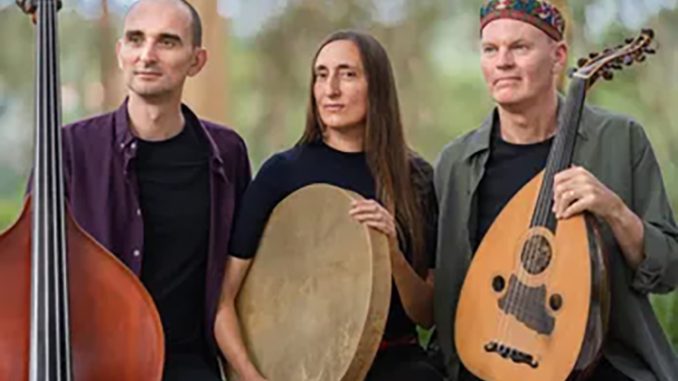
By Chris Lambie.
ABC Classic’s recent radio poll revealed Australian listeners’ 100 favourite musical instruments. With cello at number one, upright or double bass was 18th, oud 16th and 22% of votes for various forms of percussion. Brisbane-based trio East of West present a compelling meeting of some of these popular media. Their technical virtuosity is evident but the intuitive interplay between band members delivers a special touch of magic.
Bosnian-born double bass player and composer Goran Gajić has performed in Europe and at Australian festivals including Mona Foma, the Woodford Folk and Blue Mountains Music Festivals. Philip Griffin (Oud, Laouto) is a musician, arranger and composer having worked with the Royal Shakespeare Company, Opera Australia and Balkan bands. Hand percussionist and composer Malindi Morris draws on influences from the Mediterranean, Balkans, Turkey and Iran. She has studied and performed in Australia and Europe. Her projects include The Transbalkan Express, Dastan Sufi group and the Hikayat Ensemble.
Group founder Gajić says, “There’s a special connection, not just with music, but when a group of players get to know one another, it becomes another level of interacting.” Alongside their played notes, critics celebrate the role of silences between. “Especially when arranging, I try to get this sort of element. Tunes could be very busy with lots going on all the time. But I’m making an effort to have that space in between instruments. It started as a conscious thing but now, after playing together for about five years, we’re all used to it.”
 East of West’s second album Moving Home balances spirited improvisation with measured and emotive solo outings to create mesmerising soundscapes. When a friend was preparing to move house, Gajić recalled his own relocation from Bosnia to Australia. “It’s almost as hectic whether you’re moving to another country or another suburb. People started moving again after border closures. Then my partner Malindi (from the band) and I moved from Brisbane to Ipswich.” Moods on some tracks reflect the times. “That weird period. For me, the feeling of everything stopping reminded me almost like wartime in Bosnia. A crisis time when everything becomes quite still. All these things we rush around and worry about become so unimportant.” A national launch tour for debut album Little Harbour was derailed by border closures. The new album’s opening track ‘Little Harbour 2’ offers a bridge between the releases. Gajić says, “[They] have a similar vibe. Both were written in Leigh [NZ] a little fishing harbour. A quite still place. Almost like Covid before Covid,” he laughs. “It’s so chilled and reminded me of my childhood sea holidays in Croatia, with its rocky shores.”
East of West’s second album Moving Home balances spirited improvisation with measured and emotive solo outings to create mesmerising soundscapes. When a friend was preparing to move house, Gajić recalled his own relocation from Bosnia to Australia. “It’s almost as hectic whether you’re moving to another country or another suburb. People started moving again after border closures. Then my partner Malindi (from the band) and I moved from Brisbane to Ipswich.” Moods on some tracks reflect the times. “That weird period. For me, the feeling of everything stopping reminded me almost like wartime in Bosnia. A crisis time when everything becomes quite still. All these things we rush around and worry about become so unimportant.” A national launch tour for debut album Little Harbour was derailed by border closures. The new album’s opening track ‘Little Harbour 2’ offers a bridge between the releases. Gajić says, “[They] have a similar vibe. Both were written in Leigh [NZ] a little fishing harbour. A quite still place. Almost like Covid before Covid,” he laughs. “It’s so chilled and reminded me of my childhood sea holidays in Croatia, with its rocky shores.”
A fusion or interplay of Balkan, jazz and classical inspiration, the result is unique. “I write in some time signatures, like 7/8, that are quite common in Bosnia. You don’t think about it being something odd or not normal. Also some melodic influences from Balkan music and the instrumentation; The oud is not common in Bosnia but is in Greece and Macedonia. Malindi’s drums are the darbuka, daf from Persia and frame drums from the Middle East.” He attained a jazz degree in Queensland. “My first aim was to play jazz. But then I thought, ‘A lot of people are playing jazz and I have this other side I’m interested in.’” Gajić played bass guitar before taking up the double bass. The driving role of the larger instrument was appealing, where it connects harmony and rhythm. “Usually, people relate jazz as having jazz harmony elements but we try to open it up. We play more maybe folk or [World music] festivals in Australia. In Europe, there are more ethnic influences featuring at jazz festivals. We’re up for this.”
Morris played flute for five years before turning to something with ‘more punch’, learning percussion with South Indian-trained Tunji Beier. “He also [uses] African and Balkan influences,’ Morris says. “I love the community elements of this music, mixing the music and dance – involving rhythms and melodic motifs of those styles.’ Her beats on such as tracks ‘Mango Tree’ and ‘Lahor’ traverse unexpected rhythmic places. “These compositions allow for… transitions between rhythmic and atmospheric spaces. [Beyond] just playing a rhythmic groove throughout a whole piece. A trio has limitations on scope for dynamic and textural shift. You have to think like you’re not necessarily a rhythm machine. Like a melody player providing texture as much as rhythm. Goran and Philip are very strong in the rhythm too, so you don’t need everybody grooving out on the rhythm all the time. Usually there’s somebody who’s floating over the top.”
Moving Home is available on Bandcamp here: https://eastofwestmusic.bandcamp.com/album/moving-home
East of West begin a tour on July 9. Dates can be found here: https://www.eastofwestmusic.com/shows

